
Imagery Majestic - Fotolia
6 enterprise data storage startups to watch in 2020
Even as cloud and flash flourish, it is tougher than ever for data storage newcomers to take root. We've highlighted six startups trying to crack the enterprise market.
Venture capitalists showed less interest in funding storage hardware startups in 2019 than previous years. But while most of the investments for data storage startups in 2019 went to mature data protection vendors, a few newcomers picked up enough funding to get on the map.
Most new funding for data storage startups is going to companies in cloud backup, converged data management and next-generation flash media. Here's a look at startups worth watching in 2020, including a few who relaunched under new names with new leadership.
Bamboo Systems
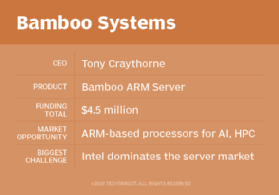
Bamboo is an evergreen plant that is hard to kill. Startup Bamboo Systems has similar aspirations in enterprise storage servers, but it has its work cut out in a market dominated by Intel.
Bamboo Systems has patented hyper-converged infrastructure that uses ARM-based servers, in conjunction with traditional flash storage and RAM, to tackle high-performance computing workloads.
Bamboo designed its servers for next-generation data centers that measure power in kilowatt hours, as opposed to GhZ or the number of processor cores. Most server products with ARM processors aren't equipped for massively parallel workloads.
Bamboo servers have a dense configuration of commodity ARM processors, which the vendor claims consumes 75% less power than an equivalent Intel Xeon-based system at one-third the cost.
This marks the second appearance on our Startups to Watch list. The company was formerly known as Kaleao and prepared a hyper-converged platform for launch, but it never got off the ground.
Clumio

Clumio provides backup and disaster recovery as a managed cloud service. The vendor is hoping that more companies will start to decommission backup hardware and shift data to secure cloud storage. Investors have poured more than $186 million in Clumio since it emerged from stealth, including a $135 million round in November.
The first Clumio service protects data in VMware virtual machines, running locally and in Amazon Web Services. That reflects Clumio founders' ties to VMware and hyper-converged infrastructure pioneer Nutanix.
The Clumio suite also provides backup for Amazon Elastic Compute Cloud and Elastic Block Store. The vendor said Microsoft Hyper-V support is a roadmap item.
Although SaaS is taking root, Clumio needs to siphon share from established vendors. The crowded space includes managed cloud vendors by Barracuda and Druva, along with Commvault, Cohesity and Rubrik.
Formulus Black
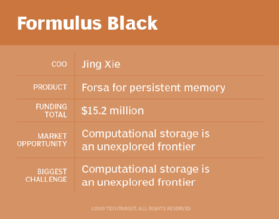
Formulus Black is also back on this list after rebranding under new management. Formerly known as Symbolic IO, the startup, based in Holmdel, N.J., provides a Linux-based software stack to advance computational storage for cloud and enterprise workloads.
Formulus Black allows user to build in-memory architecture without modifying software or databases. The enabling technology (created by Symbolic IO) shrinks the data footprint in dynamic RAM (DRAM) using a patented process that reorders how binary bits are processed.
Formulus Black reentered the world of data storage startups in 2019 with a Linux-based Forsa software stack to juke performance. The software stack enables applications and data to reside in dynamic RAM. Forsa provisions persistent memory as low-latency storage in a two-socket server, with high availability and scale out capabilities. The company said it is validating the use of Intel Optane SSDs, which are based on 3D XPoint storage class memory (SCM).
Formulus Black will have a leadership change in 2020. Mark Iwanowski, who spent time as an NFL tight end with the New York Jets in 1978, became the Formulus Black CEO in July 2019 but left in December for health reasons.
Kasten
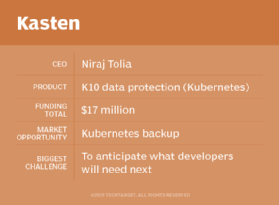
Containers are the newest form of virtualization. Industry observers said Kubernetes has emerged as the dominant orchestration layer for large-scale deployment of containers. Startup Kasten has jumped in to fill a market not yet fully fleshed out: protecting data inside Kubernetes containers.
Kasten's K10 cloud-based platform provides application mobility, backup and restore, and disaster recovery across multiple hybrid clouds, including polyglot persistence. The product gives enterprise operations a bird's-eye view of data inside containers, along with simplified management for enacting data protection.
Version 2 of K10 addresses data security after placing data into a container cluster. Security features include access management, AWS Identity and Access Management, customer-managed keys and integrated data encryption of artifacts at rest and in flight. Automated application discovery, compliance monitoring and policy-based workflows simplify operations.
Lightbits Labs
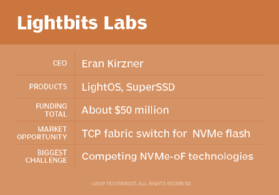
Lightbits Labs enables native Transmission Control Protocol/Internet Protocol (TCP/IP) to serve as a switched fabric for shared NVMe flash across server racks. The vendor claims to deliver the performance of direct-attached storage as composable infrastructure.
Lightbits Labs introduced three products: LightOS software, the SuperSSD NVMe all-flash array and the LightField accelerator card. The goal is to capture stranded capacity and enhance the performance of low-latency NVMe flash.
LightOS converts TCP/IP packets into NVMe streams. It routes communications between network ports and NVMe cards. Data services include compression/thin provisioning, data placement, erasure coding and quality of service.
Organizations could license LightOS on preferred servers or on SuperSSD arrays. An optional ASIC-enabled LightField offload card can quickly rehydrate SuperSSD data.
Vast Data
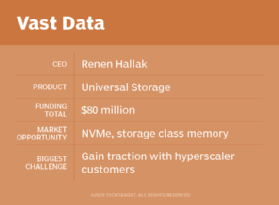
Vast Data makes no secret about its eventual goal: render disk arrays irrelevant. It's a lofty claim, but the startup has believers, as evidenced by its huge funding haul from large storage vendors and venture firms.
Vast Data claims Universal Storage can handle the most demanding workloads, provides exabyte-scale capacity and flash at the cost of spinning disk.
The startup mixes low-cost, lower endurance quad-level cell (QLC) solid-state drives and high-performance 3D XPoint SCM drives along with non-volatile memory express over fabrics (NVMe-oF) to connect nodes. The Vast Data storage packages a high-availability NVMe flash enclosure with four controller heads, known as C Nodes. QLC acts as a translation layer for intelligent data placement. The 2U enclosure integrates a 3D XPoint buffer to prolong the life of QLC SSDs.
Vast separates the control layer from the system state, allowing independent scaling and tenant-based pooling of Vast containers across NVMe enclosures for high availability. The shared-everything architecture enables global algorithms that enhance efficiency, resiliency and scale.








